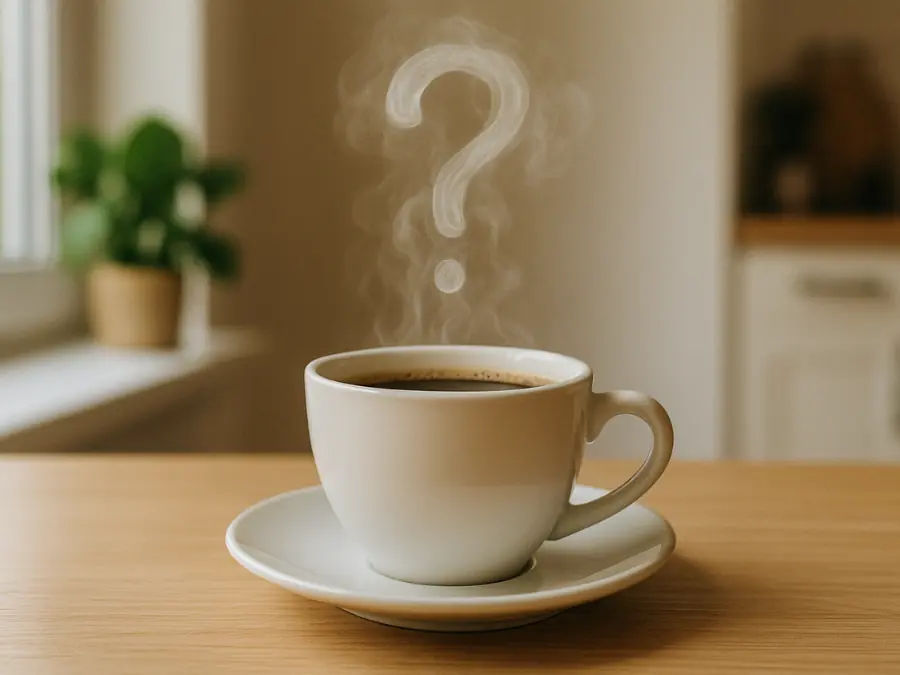Caffeine withdrawalThe process of eliminating caffeine from your daily routine can be a challenge. If you're one of those people who rely on their morning cup of coffee to start the day, the thought of giving up caffeine may seem daunting. But have you ever thought about the benefits of going caffeine-free? The effects can be life-changing.
From an improved quality of sleep over a better digestionincreased energy levels and reduced anxiety - the benefits of going caffeine-free are numerous. In this article, we'll look at what you can expect during the caffeine withdrawal process and provide tips to ease the transition. So, whether you're a die-hard coffee lover or simply curious about a caffeine-free lifestyle, read on to discover what to expect during caffeine withdrawal.
Why should you get rid of caffeine?
Caffeine is one of the world's most consumed psychoactive substances. It is found in numerous drinks such as coffee, tea and energy drinks as well as in chocolate and some medicines. Caffeine has stimulating effects on the central nervous system and can therefore lead to a temporary improvement in mood, energy, concentration and alertness. On the other hand, however, caffeine can also have negative effects on health and can lead to addiction, sleep problems and other health problems. health problems problems. For these reasons, many people decide to get rid of caffeine and lead a caffeine-free lifestyle.
One of the main problems with caffeine is its effect on sleep. Caffeine can disrupt the sleep by prolonging the time it takes to fall asleep and reducing the quality of sleep. In addition, caffeine can also make you feel tired and groggy the next day. For people who suffer from sleep disorders avoiding caffeine can be an important first step in improving the quality of their sleep.
Another problem with caffeine is its effect on the physical health. Caffeine can lead to an increased blood pressure and heart rate, which can be particularly problematic for people with heart disease or high blood pressure. In addition, caffeine can lead to stomach problems such as heartburn and irritable bowel syndrome. If you want to avoid these negative effects on your body, it can be helpful to cut caffeine out of your diet.
The simple withdrawal process from caffeine
Withdrawing from caffeine can be a challenge especially for people who have built up a high tolerance to caffeine. If you decide to cut caffeine out of your diet, you should be prepared to deal with some withdrawal symptoms. These can include headaches, irritability, fatigue, concentration problems and sleep disturbances. It's important to understand that these symptoms temporary and usually subside after a few days.

There are several ways to ease caffeine withdrawal. One way is to gradually reduce your caffeine intake rather than stopping abruptly. This can help minimize withdrawal symptoms and ease the transition to a caffeine-free lifestyle. Another option is to drink enough water and eat a balanced diet during withdrawal to support the body.
A good Night rest and regular exercise can also help to reduce the symptoms of caffeine withdrawal. However, it's important to note that everyone can react differently to caffeine withdrawal and it's normal to feel unwell during withdrawal. If you are struggling to cope with withdrawal symptoms, you should speak to your doctor or a professional for support and advice.
10 simple tips for successful caffeine withdrawal
Caffeine is a common stimulant found in coffee, tea, energy drinks and other beverages. Although caffeine has a temporary energy boost excessive consumption can lead to dependence and withdrawal symptoms when trying to quit. Here are 10 simple tips for successful caffeine withdrawal.

1. reduce your caffeine intake slowly
If you consume a lot of caffeine, abrupt withdrawal can lead to unpleasant withdrawal symptoms such as headaches, fatigue and irritability. One gradual reduction of consumption over a period of a few weeks or even months can help to minimize withdrawal symptoms.
If this step is also too difficult for you, switching to a source of caffeine such as matcha can be a first step. Here, the caffeine is in a powdered form and therefore has a gentler effect.
2. replace caffeine with other drinks
Caffeine-free coffee, herbal tea and water are good alternatives. alternativesto hydrate your body and reduce caffeine cravings at the same time. Especially alternatives like lupin coffeewhich contain no added sugar, are particularly suitable for this. It is important to drink enough fluids to avoid dehydration during withdrawal.
3. avoid foods containing caffeine
Caffeine is also contained in some foods such as chocolate, energy drinks and cola. It is advisable to limit the consumption of these foods during caffeine withdrawal in order to minimize withdrawal symptoms.
4. get enough sleep
Lack of sleep can lead to exhaustion and fatigue during caffeine withdrawal. It is important to get at least seven hours sleep per night to feel rested and energized.
5. drink enough water
Caffeine has a diuretic effect, which means that it can flush water out of the body. It is important to drink enough water during withdrawal in order to dehydration and to support the body.
6. healthy diet
A balanced and healthy diet is particularly important during caffeine withdrawal in order to give the body the nutrients it needs to cope with withdrawal symptoms. Try to eat fresh, nutrient-rich foods such as fruit, vegetables and whole grains.
7. exercise
Exercise can help to stimulate the body and minimize withdrawal symptoms. However, it is important, moderate and avoid overexertion, as this can make withdrawal worse.
Exercise can also help to rebuild the energy lost through caffeine withdrawal. So try to exercise regularly or simply go for a quick walk around the block.
8. reduce stress
Stress can exacerbate withdrawal symptoms and delay recovery. So try to, relaxation exercises such as yoga, meditation or breathing exercises to reduce stress and make withdrawal easier.
9. distance yourself from caffeinated environments
Avoid caffeinated environments such as coffee houses or cafésto resist the temptations of consumption. If it's difficult to find caffeine-free options, drink water or tea instead.
10. be patient
Successful caffeine withdrawal requires patience and perseverance. Don't give up and hang in there.
10 symptoms of caffeine withdrawal that you should understand
Caffeine is one of the most widely consumed psychoactive substances in the world, but suddenly cutting it out can lead to unpleasant withdrawal symptoms. Here are 10 common caffeine withdrawal symptoms you should understand to be better prepared for caffeine withdrawal. From headaches to Cravingsyou'll learn what to expect during withdrawal and how to cope.

1. headaches
Headaches are one of the most common withdrawal symptoms and can be both mild and severe. They occur as the brain and the nervous system react to the withdrawal of caffeine.
2. exhaustion
Caffeine withdrawal can lead to severe fatigue as the body has become accustomed to the energy boost of caffeine.
3. irritabilityCaffeine affects the central nervous system and helps to regulate mood. If caffeine consumption is stopped abruptly, this can lead to irritability, bad mood and mood swings.
4. difficulty concentrating
Caffeine increases the ability to concentrate and helps with focus. Withdrawal from caffeine can decrease concentration and it can be difficult to concentrate on tasks.
5. sleep disorders
Caffeine has a stimulating effect and can impair sleep. Withdrawal from caffeine can lead to sleep disorders such as insomnia or restless sleep.
6. muscle tension
Caffeine can lead to muscle tension. Withdrawal from caffeine can lead to these symptoms worsenas the body adapts to the absence of caffeine.
7. nausea
Some people may experience nausea and digestive problems during caffeine withdrawal. This may be due to the changes in the digestive system caused by caffeine withdrawal.
8. dizziness
Caffeine can increase blood pressure, and withdrawal from caffeine can cause a temporary dizziness. drop in blood pressure which can lead to dizziness.
9. depression
Caffeine can lighten the mood of some people. If caffeine consumption is stopped abruptly depressive symptoms may occur.
10. ravenous appetite
Caffeine can increase Appetite and withdrawal from caffeine can lead to cravings. The body can crave sugar and carbohydrates to satisfy the missing energy boost by caffeine.
How much caffeine is too much?
While caffeine can be safe and even healthy in moderation, excessive consumption can lead to unwanted side effects.
The recommended maximum daily dose of caffeine varies according to age, gender and health status. For most healthy adults, a daily intake of up to 400 milligrams of caffeine is considered safe. This is equivalent to about four cups of coffee or 10 cans of cola.

With Children and adolescents the consumption of beverages containing caffeine should be limited, as the consumption of too much caffeine can lead to sleep disorders, nervousness, irritability and increased heart rate in children.
It is also important to note that everyone reacts to caffeine individually and that some people are more sensitive to caffeine than others. People with certain medical conditions, such as heart disease or anxiety disordersshould limit their caffeine consumption or avoid it altogether.
If you are unsure about your caffeine intake, talk to your doctor or a dietitian to determine if reducing your intake makes sense for you.
What are the symptoms of too much caffeine?
Although caffeine can be safe in moderation, excessive consumption can cause unwanted effects on your health. Too much caffeine can lead to a variety of symptoms ranging from mild discomfort to serious health problems. In this article, we will discuss some of the most common symptoms of too much caffeine to help you keep an eye on your caffeine intake and protect your health.

1. sleep problems
Too much caffeine can disrupt sleep and lead to sleep problems such as insomnia, restless sleep and early awakening.
2. nervousness
Caffeine affects the central nervous system and can make you feel nervous and restless. Too much caffeine can intensify these symptoms.
3. palpitations
Caffeine can increase the accelerate the heartbeat and lead to an irregular heart rhythm. If you consume too much caffeine, you may experience palpitations or heart palpitations.
4. headaches
Although caffeine can relieve headaches in some people, it can cause headaches in others, especially if they consume too much.
5. nausea
Caffeine can also cause nausea and digestive problems and digestive problems. Too much caffeine can increase these symptoms and make you feel sick.
6. muscle pain
Caffeine can also cause muscle tension and pain. Too much caffeine can intensify these symptoms and lead to muscle cramps and twitching.
7. anxiety
Too much caffeine can also lead to anxiety and panic attacks especially in people who are prone to them.
8. dehydration
Caffeine has a diuretic effect and can cause the body to excrete more fluid. If you consume too much caffeine and don't drink enough water, you can dehydrated become dehydrated.
9. high blood pressure
Caffeine can also increase blood pressure, especially in people who sensitive to it. Too much caffeine can lead to a temporary increase in blood pressure.
10. addiction
If you regularly consume large amounts of caffeine, you can become addicted to it and withdrawal symptoms when you try to reduce or stop consumption.
Who should avoid caffeine?
Although caffeine is safe for many people, there are some people who should avoid caffeine or whose caffeine consumption should be limited. Here are some groups of people who should avoid caffeine:

1. pregnant women
Pregnant women should limit their caffeine intake or avoid it altogether, as high caffeine consumption can increase the risk of miscarriage, premature birth and low birth weight.
2. people with anxiety
People with anxiety or panic attacks should limit or avoid their caffeine intake as caffeine can stimulate the nervous system and exacerbate anxiety.
3. people with high blood pressure
Caffeine can increase blood pressure, so people with high blood pressure should avoid caffeine.
4. people with stomach problems
Caffeine can cause stomach problems such as heartburn and stomach irritation Therefore, people with stomach problems should limit or avoid their caffeine consumption.
5. children
Children should limit or avoid their caffeine intake as caffeine stimulates the nervous system and can lead to nervousness and sleep problems in children.
6. people with sleep problems
Caffeine can affect sleep, so people with sleep problems should limit their caffeine intake. caffeine consumption or avoid it.
How can caffeine deprivation help you lose weight?
If you are trying to lose weight, caffeine deprivation may be beneficial.
One possible reason why abstaining from caffeine can help you lose weight is that caffeine has an effect on the blood sugar levels has. Caffeine can help increase blood sugar, which in turn stimulates the release of insulin. Insulin is a hormone that signals the body to store fat instead of burning it. A high insulin production can prevent the body from breaking down fat and losing weight.

Another factor that plays a role in weight loss is the sleep. Caffeine can affect sleep, especially if consumed late in the day. A lack of sleep can lead to lower production of leptin a hormone that regulates satiety and suppresses appetite. When you are tired, you may tend to eat more and consume more calories overall.
Withdrawing from caffeine can also make you feel better overall and more motivated to make good decisions. Many people report a an increase in energy and concentration after caffeine withdrawal. By reducing caffeine, you can also improve your overall health and well-being by potentially experiencing better sleep, less stress and healthier digestion.
It's important to note that cutting out caffeine alone is not a miracle cure for weight loss is. It's still important to eat a balanced diet and incorporate regular exercise into your routine. However, if you suspect that caffeine may be contributing to weight gain or other health issues, caffeine withdrawal may be able to help you achieve your goals. However, it is always advisable to speak to a doctor or nutritionist before making any changes to your diet or lifestyle.
How can caffeine withdrawal help you relieve headaches?
Caffeine can help to relieve headaches by reducing the Dilating blood vessels in the brain and thus increasing blood flow. On the other hand, a sudden withdrawal from caffeine can lead to headaches caused by the constriction of blood vessels in the brain.
If you consume caffeine regularly and try to reduce or eliminate consumption, you may initially experience headaches. These headaches can last up to a week as the body adapts to the withdrawal of caffeine. This is known as caffeine withdrawal headache referred to as caffeine withdrawal headache.
To relieve headaches caused by caffeine withdrawal, you can gradually reduce your caffeine intake instead of stopping abruptly. This will allow you to experience caffeine withdrawal gradually and avoid or minimize headaches.
You can also alternative methods to relieve headaches, such as a healthy diet, regular exercise, getting enough sleep and stress reduction techniques like meditation or yoga.
Overall, caffeine withdrawal can help with headaches by helping to eliminate the causes of headaches and develop alternative strategies for pain relief.
How can caffeine withdrawal help with depression?
There are many factors that can contribute to the development of depression, and caffeine can be one of them. Although caffeine is initially a stimulating effect it can lead to a worsening of mood and symptoms of depression if consumed regularly. Reducing or eliminating caffeine can help to alleviate the symptoms of depression.

One of the reasons why caffeine can be harmful for depression is because it inhibits the production of adenosine in the brain. Adenosine is a neurotransmitter that is involved in regulating mood. When you consume caffeine, it blocks the receptors for adenosine, which reduces the production of dopamine and other neurotransmitters increased which can have a positive effect on mood. However, if caffeine consumption is discontinued, this can lead to a lack of dopamine and other neurotransmitters, which can have a negative effect on mood.
Another reason why caffeine can be harmful for depression is that it increases the impairs sleep. Sleep disturbances can be one of the causes of depression or contribute to worsening symptoms. Reducing or eliminating caffeine can help improve sleep and alleviate the symptoms of depression.
If you suffer from depression, it may make sense to reduce or eliminate your caffeine intake. However, it is important to do this slowly and gradually to avoid withdrawal symptoms. Also talk to a doctor or therapistto get comprehensive treatment for your depression.
Is it worth giving up caffeine? Should I go caffeine-free?
Whether it's worth giving up caffeine depends on your individual circumstances. needs and preferences depends on your individual needs and preferences. However, if you suffer from the negative effects of caffeine, giving it up can offer many benefits.
Too much caffeine can lead to unpleasant symptoms such as headaches, insomnia, irritability and heart palpitations. Caffeine can also increase the risk of certain diseases such as high blood pressure, osteoporosis and gastrointestinal problems.
However, if you want to live caffeine-free, there are many alternativesthat can help you increase your energy and concentration. These include regular exercise, sufficient sleep and a balanced diet.

There is a large market for caffeine-free alternatives: one sustainable and tasty option is lupin coffee, for example.
If you decide to give up caffeine, you should take it slowly and gradually get your body used to it. You can also try alternatives such as decaffeinated coffee or herbal teas.
Overall, cutting out caffeine can offer many benefits and improve your health. However, if you want to continue consuming caffeine, you should be aware of how much you are consuming and the effects it has on your body.
How can lupin coffee help me get rid of caffeine?
Lupin coffee can be a great alternative if you're trying to get rid of caffeine. Lupin coffee is a caffeine-free drink made from roasted lupin beans beans. It has a mildnutty flavor and is rich in protein, fiber, antioxidants and minerals such as iron and calcium.
If you're trying to get rid of caffeine, lupin coffee can help by offering you an alternative that doesn't contain caffeine. It can help you to improve the taste of coffee. enjoywithout having to worry about the effects of caffeine. It can also help reduce withdrawal symptoms such as headaches and fatigue, as the coffee ritual can 'trick' your brain into thinking it has a calming effect.



















1 Comment
Gerlinde
Liebes Loffeeteam,
Kompliment an euch, fünf Sterne. Ich bin schon seit längerer Zeit auf der Suche nach gutem Kaffeeersatz, der nicht nur wie Kaffee riecht, sondern auch wie Kaffee schmeckt. Habe mittlerweile auch einige Alternativen aus dem Reformhaus ausprobiert. Unter anderem auch Lupinen Kaffee, Getreide-Kaffee, Zichorie-Kaffee und ich muss sagen, euer Lupinen Kaffee übertrifft alle anderen Kaffealternativen bei weitem an Geschmack und Genuss. Vielen Dank. Endlich bin ich fündig geworden und kann euren Loffee nur jedem empfehlen, der es einmal ausprobieren möchte. Viele Grüße
Liebes Loffeeteam,
Kompliment an euch, fünf Sterne. Ich bin schon seit längerer Zeit auf der Suche nach gutem Kaffeeersatz, der nicht nur wie Kaffee riecht, sondern auch wie Kaffee schmeckt. Habe mittlerweile auch einige Alternativen aus dem Reformhaus ausprobiert. Unter anderem auch Lupinen Kaffee, Getreide-Kaffee, Zichorie-Kaffee und ich muss sagen, euer Lupinen Kaffee übertrifft alle anderen Kaffealternativen bei weitem an Geschmack und Genuss. Vielen Dank. Endlich bin ich fündig geworden und kann euren Loffee nur jedem empfehlen, der es einmal ausprobieren möchte. Viele Grüße